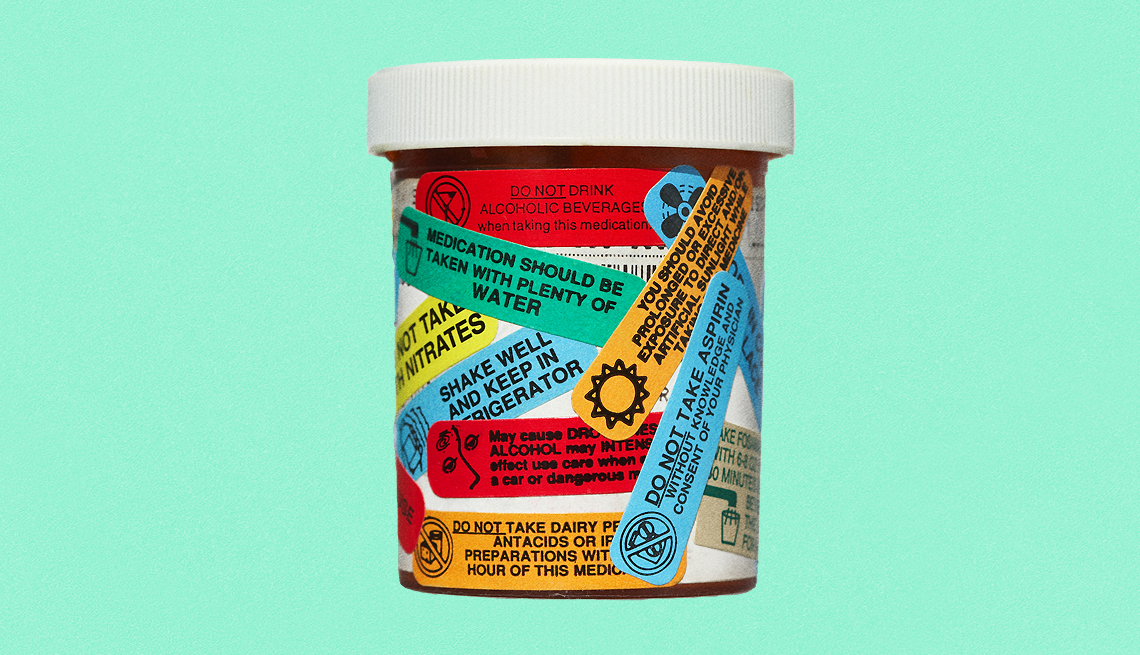AARP Hearing Center


Taking even one medication correctly and on time each day can be a challenge. In fact, research shows that as many as half of all patients don’t follow their medication instructions properly.
For older adults who often juggle multiple medicines, the challenge is even greater.
“Their regimens are more complicated,” says David Bates, M.D., director of the Center for Patient Safety Research and Practice at Brigham and Women’s Hospital and a professor of medicine at Harvard Medical School. “The more medications you take, the easier it is to get mixed up.”
With each drug having its own dosage, timing and instructions, keeping everything straight can be overwhelming. So it’s no wonder that medication mistakes happen – whether it’s forgetting a dose, taking a drug at the wrong time or misunderstanding the instructions.
Medication mistakes can cause real patient harm, leading to poor outcomes, hospitalization or even death in severe cases. About 15 percent of older adults who seek care from a doctor or a hospital every year have suffered a medication problem, research shows; in about half the cases, the problem was preventable. AARP asked experts to identify some of the ways you’re most likely to mangle your meds, and how to prevent each problem.
1. Mistake: You skip one or more doses
One of the most common medication mistakes is skipping one or more doses, whether it’s an intentional strategy to save money or because you simply forgot. A 2021 study found that 8 percent of American adults, or about 9.2 million people, don’t take their medication as prescribed because of the cost.
While missing a dose or two might not seem like a big deal, it can have significant consequences, Bates says. For instance, if you have diabetes, not taking your insulin can cause life-threateningly high blood sugar levels.
To stay on top of your meds, set reminders on your phone, use a pill organizer or enlist the help of a friend or family member.
If cost is the issue, talk to your pharmacist about options, suggests Chad Worz, a geriatric pharmacist and chief executive officer for the American Society of Consultant Pharmacists. They can search for discounts or talk to your doctor to see if a less expensive medicine can be prescribed.
“Especially if it is a branded drug, the manufacturers might offer a way to afford it,” Worz says. “There are also a lot of programs out there to help.”
2. Mistake: You miss a pill and then double up
Have you ever forgotten if you’ve taken a pill and popped another just to be safe? Doubling up on medicines can be dangerous, says Hedva Barenholtz Levy, a geriatric pharmacist and author of Maybe It’s Your Medications.
An overdose of a blood thinner can cause bleeding, for example, while taking too much of a beta blocker can cause dangerously low blood pressure, dizziness and fainting.
“Don’t take it if you’re not sure,” Barenholtz Levy says. “Check with your pharmacist before you take a second one or skip that day all together.”
If you know you forgot a dose and it’s a medication you take two or three times a day, you also need to consider how close you are to the next dose. “If you remember the missed dose within two hours, yes, take the medication as soon as you remember,” Barenholtz Levy says. “If it is close to the time for the next scheduled dose, then you should skip the missed dose and simply take the next dose at the scheduled time.”
To make things easier, use a pill holder that has compartments for each day. Some “smart” pillboxes even have alarms or pair with smartphone apps to deliver reminders. Another option: Some pharmacies can place your medications in blister packs or pouches labeled by day and time to make it easier to keep track of pills.
3. Mistake: You hurry out of the pharmacy
When you’re picking up prescriptions at the pharmacy, you may be tempted to grab them and go.
But pharmacists sometimes hand patients the wrong drug or dose, which can have devastating consequences. One review study estimates that dispensing errors affect more than 2 out of every 100 medications distributed by local drugstores.
So no matter how many people are waiting behind you in line, take a minute to verify that you received the right med at the dosage you expected, says pharmacist Michael Gaunt, senior manager of error reporting programs at the Institute for Safe Medicine Practices. “Patients feel pressured at the counter, but take the time to open the bag and make sure it’s the right medicine. Make sure your name is on the label, on the bottle and even open the bottle at the counter to see if it looks the same. If it doesn’t, ask questions.”
It’s also a good time to ask any questions you have about your medications, potential interactions, and how and when to take them, Gaunt says.





































































More on Health
Sanjay Gupta, M.D., Reports on Groundbreaking Alzheimer’s Research
‘The Last Alzheimer’s Patient’ Reveals Hopeful NewsVitamins You Can Overdo
Taking too many of these can be dangerous3 Trendy Supplements: Do They Work?
What to know about ashwagandha, berberine and bilberryRecommended for You